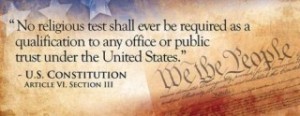I am about to do something that gives me the heebie-jeebies. I am going to challenge a premise by one of the nine people who serve on the U.S. Supreme Court.
Justice Antonin Scalia told a group of high school students this weekend in New Orleans that the U.S. Constitution does not compel “religious neutrality.”
Well, Mr. Justice, I believe it does.
Scalia, a deeply religious Roman Catholic, told the students that the Constitution prohibits government from adhering to a specific religion, but it does not compel government to ban references to religion in general.
He said it’s all right for government officials to invoke God in public.
Sure it is. Presidents of both parties have been ending public speeches for as long as I can remember — and that goes back a ways — with the words ” . . . and may God bless the United States of America.”
But I have been reading the Constitution since I was old enough to read anything and I can find precisely two uses of the word “religion” or “religious” in that document. It’s in Article VI, where it says there shall be “no religious test” required of any individual seeking any public office at any level in the United States of America; and it’s also in the very First Amendment, where it says Congress “shall make no law respecting an establishment of religion or prohibiting the free exercise thereof . . . ”
The rest of it is secular by design.
I agree with Justice Scalia that “God has been good to us” as a nation. But he seems to be getting a bit ahead of himself when he implies that “religious neutrality” seems intended to deprive Americans the right — or the desire — to worship as they see fit.
The individuals who founded this nation knew exactly what they were doing when they created the Constitution. They meant for it to be free of religious dogma. Yes, some have taken that intent too far by suggesting that we should remove “In God We Trust” from courtroom walls or from our currency.
However, I happen to quite comfortable with “religious neutrality” as it relates to our government.
I’m still free to go to church and pray to God. I will do so again today.

If you look at the reason for the amendment historically, it was put in place to limit the federal government from establishing a state religion like England had done and forcing people to adhere to it. It was meant to allow people the freedom to choose whatever religion they wanted. It in no way limited individuals in government from practicing or talking about what they believed. It did not encourage government neutrality, but rather limited governments right to force people into a particular religion.